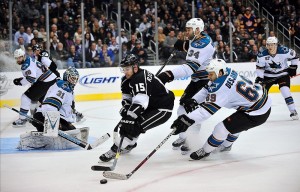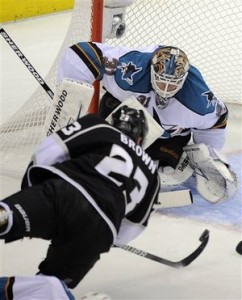
On Tuesday night, Antti Niemi stared down the black and silver jersey of Los Angeles Kings forward Dwight King. The fittingly named winger ripped a shot from the slot but was robbed with a quick flash of leather by the Sharks goaltender. Niemi’s save kept San Jose in the tied game and eventually allowed the Sharks to force the game into a shootout (which they would win). His 41 stops led the Sharks into a tie with the Kings for the fourth seed in the playoffs. But is Niemi the only reason for the Sharks recent frenzied push into the Western Conference ranks.
Antti Niemi is the Sharks’ MVP
Antti Niemi was once in the talks for the Vezina. But the landmark stats have turned attention towards names like Craig Anderson and Sergei Bobrovsky. Anderson may lead the league in save percentage at .949 (Niemi is 4th) and goals against average at 1.55, but there is more to minding the net than those stats.
What Antti Niemi does lead in are three stats: total saves per game, shootout wins, and victories. The Sharks keeper has been consistent and strong most of the season, and that is personified in a mind-boggling stat in this lockout shortened season. Antti Niemi has played and started 39 games for the Sharks. He has played a staggering 2,344 minutes on the ice in a season where goalies by committee have been necessary to save stamina. Despite a rough stretch while the entire Sharks team went cold and he was pulled twice, Niemi has been a rock in the back. His save percentage has never dropped below .920 during the season. He has 1034 saves second only to Ryan Miller of the Buffalo Sabres, who are likely going to miss the postseason.
Perhaps last night was the brightest moment of Niemi’s season. In a playoff atmosphere against division-rival Los Angeles, Niemi stopped a season-high 41 out of 43. He came up clutch in the third period twice and was perfect in the shutout. Niemi won a Stanley Cup with the Chicago Blackhawks in 2010 and was especially clutch in the pivotal Game 2. He looks to take his new team back there this year.
The Sharks Skaters Block Shots
Frustration is an emotion that is not allowed in a playoff series. If a team loses their cool in a few games, their chances of bouncing back and winning the series plummets. Just ask last year’s Pittsburgh Penguins. As the Flyers bullied the Pens in a series where goals came by buckets, Sydney Crosby could not keep his mind on scoring and instead found himself arguing with coaches and refs and picking fights he could not win.
The Sharks will not take the heavy hitter and aggravating role through the postseason though. San Jose will employ the safest kind of frustration: shot blocking. Maybe not safest in terms of physical well-being, but the less shots that get through to Niemi the better, right? The Sharks only trail the Colorado Avalanche and Toronto Maple Leafs in blocked shots with 713. When your forwards shots keep getting knocked down in front, they lose focus. And losing focus in the playoffs can cost a team a series.
“You miss 100% of the shots you don’t take” or shots that don’t make it to the net…
Centers Win Faceoffs
Faceoffs are even more important in the playoffs than they are in the regular season. Aside from winning possession, they allow the team that wins them to dictate the flow of the game. While there are studies that say faceoffs do not necessarily mean wins, there is definitely something important to winning the draw.
The Sharks are second in the league in faceoff percentage with 53.7% won even after shipping Handzus who had a 56% rate himself. The importance of draws lies in the puck possession it awards and in the situational faceoffs that can decide a game. While there is no harm in losing a draw, it pays to win them more often. Stats cannot show the times when your team is pressing or when it is on the ropes. Winning the faceoff after an exhausted team ices the puck can keep the pressure on them and your team’s energy high. Holding a one goal lead with thirty seconds left and losing the draw in your own end can lead to a scramble and more chances for the opponent. Really, your centers are not going to win them all, but they had better win the ones that count.
Joe Thornton, Joe Pavelski, and Logan Couture are all above 51 percent on faceoff wins. The Sharks need these three to continue to win their draws in order to dictate their calculating pace of the game. When penalty kills come up, they can kill 20 seconds just by winning the puck and sending it down ice. When they get into a close goalie duel with Jonathan Quick (you know it is going to happen) and they only lead 1-0, those big King forwards will have to chase the Sharks down in the dying seconds.
Suffocating Penalty Kill
Penalties happen, there are no two ways about it and there is no team in recent memory that has never been penalized (please correct me if this is not true). In the race to the Cup, the teams that stay out of the box and kill off the periods of time when they are in the sin bin will prosper. San Jose has been superb all season on the penalty kill sitting in fourth on PK%. That stat gets even better when the Sharks come home to HP Pavilion. With an 86.1% rate in all, the Sharks kill penalties 89.8% of the time at home.
The strength of the penalty kill can be vital in shutting down opposing offenses. While having a power play can energize a team, failing to score time after time can sink morale drastically. To show how important and how closely tied the penalty kill is to success, note that eight of the top ten penalty killing teams are currently in the playoffs if the season ended today.
No Time for Losers (At Home)

In 21 games at home this season, the San Jose Sharks have only failed to get at least a point one time. That was against a Chicago Blackhawks team that was steamrolling the entire Western Conference at the beginning of the season. The Sharks have earned 35 out 42 possible points at HP Pavilion. You read that right, the Sharks have as many points at home as the Colorado Avalanche do all season long. They are virtually a different team at home than they are on the road. No team possesses a better record on their home ice, and in the playoffs, no matter who holds home ice advantage, the Sharks can fall back on two straight games in San Jose.
Momentum is a powerful tool in the playoffs. In a seven game series, a team that loses two in a row can fall into a slump. Morale will plummet and players will lose their edge. Other than the two relevant advantages of the last change and the faceoff advantage, the home ice advantage brings your crowd and your support systems to the table. In the playoffs, the Sharks will enjoy success at home.